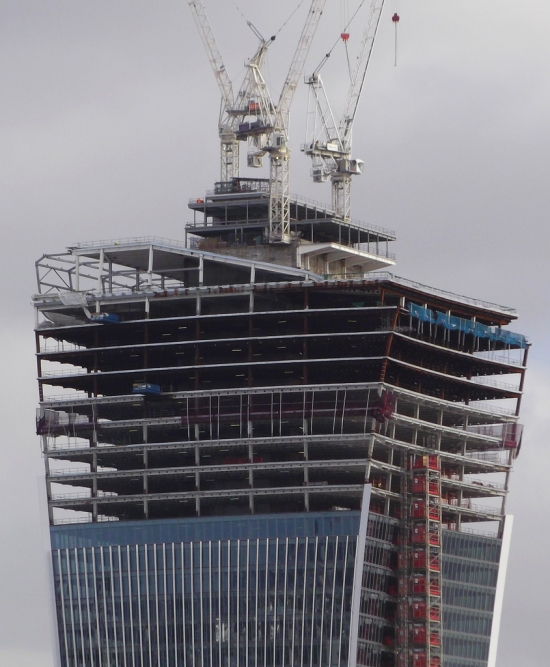Although the retail industry has suffered severe hardship in recent years, and continues to do so, other areas of industry are now considerably better off than they have been since the start of the recession in 2008.
Manufacturing has been significantly boosted by international investment by motoring firms, while companies in the financial sector are turning profits and expanding their businesses in order to cope with increasing consumer bases.
This has had an extremely positive effect upon the commercial property market, with industrial units and grade A office space in high demand across the UK.

The Walkie Talkie under construction. The London crane count is greater than the rest of the UK combined.
However, figures released by legal firm EMW Law LLP indicate that this demand is not translating to an increase in new builds, as they show that applications for planning permission for commercial developments dropped for the second consecutive year in 2012. This means that, since 2008, applications in this field have fallen by 23 per cent.
During 2012, applications to erect retail, warehouse or office properties with floor space of at least 10,800 square feet plummeted by 9 per cent to 2,100. Although applications in other areas partially compensated for this loss, equalling a 3.5 per cent drop to 38,600 applications overall, the deficit points towards a tough future for developers and businesses alike.
In fact, London is the only area of the country looking to significantly increase its square footage in terms of commercial property. Data from the Health and Safety Executive (HSE) shows that the crane count within the confines of the city has been greater than the rest of the UK combined over the past three years.
This is unsurprising, admittedly, as the value of income-producing properties in areas outside of London dropped by 7.2 per cent between September 2011 and March 2012. In comparison, values in the capital grew by 7.4 per cent according to the Investment Property Databank (IPD).
Another problem is the difficulty raising capital for speculative developments in the current economic climate.
These figures will undoubtedly come as a blow to the UK government, which has attempted to encourage property development and construction as a means of strengthening and building upon a somewhat delicate economic base.
Of course, the current situation in the retail industry can account for much of the stagnation in the field. With the popularity of internet shopping on an apparently endless upward spiral, larger retail businesses have become hesitant about constructing new properties as they fear consumers will shun them in favour of their digital counterparts. As a result, most now prefer to channel investments into improving their online presence to appeal to a larger consumer base.
With the number of new commercial builds in the UK dwindling, UK businesses must simply hope that the sector picks up soon. Otherwise, a return to economic recovery could trigger a rat race for prime properties which could leave SMEs out in the cold.
How can local authorities encourage the development of commercial space outside London?
Previous Post
Transport Report Calls for Tube Station Sponsorship